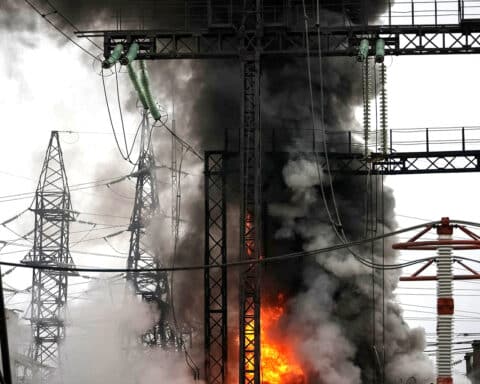When Washington’s venerable National Press Club played host last spring to a panel with the eye-catching title “Cyber Attacks and Just War Theory,” its linking of an ancient ethical theory to cybersecurity reflected the contemporary relevance of just-war thinking.
Of course, not everyone agrees it’s relevant. Some hold that nuclear weapons make the very idea of “just” war obsolete. Urging what they call “strategic nonviolence,” these people say the Second Vatican Council scrapped just-war doctrine in 1965 in calling for “a completely fresh reappraisal” of war.
But others believe just-war doctrine has much to say about the morality of violence in today’s world. One of these, John B. Hittinger, a philosophy professor at Houston’s University of St. Thomas who has written extensively on these matters, calls the Vatican II text “a nuanced and tightly reasoned piece of just-war thinking.”
A case for just war
Pope Francis appears to occupy a middle ground in this debate. In a statement for the World Day of Peace this past Jan. 1, he declared “peacebuilding through active nonviolence” to be a “natural and necessary complement” to efforts to limit the use of force by applying moral norms. In other words: not just one or the other — nonviolence or just war — but both.
Moral questions about war are painfully timely in light of fighting in Syria, Iraq, Afghanistan and dozens of other places, to say nothing of North Korea’s testing of nuclear weapons and missiles and repeated attacks by terrorists waging “asymmetrical” warfare. (An asymmetrical war is one in which one side uses conventional military means while the other side relies on things like guerrilla warfare or terrorism.)
Against this background, just-war doctrine offers principles for weighing decisions about whether to go to war and how war should — and should not — be fought. It is part of the curriculum at West Point, the Naval Academy and the Air Force Academy.
Proponents stress that just-war principles aren’t a set of mental gymnastics intended to provide an excuse for war. The aim is to prevent war if possible and limit it if it must be fought. Many would agree with the American Jesuit theologian Father John Courtney Murray that “the whole Catholic doctrine of war” is “an effort to establish on a minimal basis of reason a form of human action, the making of war, that remains always and fundamentally irrational.”
Augustine to World War II
Scholars trace the origins of the doctrine to St. Augustine, the fourth- and fifth-century bishop and theologian whose ideas have played a crucial role in shaping Western thought. In his hugely influential volume “City of God,” written as the Roman empire was coming under increasing pressure from barbarian attacks, Augustine speaks of war in a number of places.
“Crushing other peoples” to extend one’s own rule is “good fortune in the eyes of the wicked,” he writes, but for a virtuous leader seeking to repel injustice, it is only “stern necessity.” He adds that there can be “no shadow of doubt that it is greater good fortune to have a good neighbor and live in peace with him than to subdue a bad neighbor when he makes war.”
St. Thomas Aquinas in the 13th century significantly developed the doctrine. Discussing war in his Summa Theologica, the great Dominican theologian identifies three conditions that must be met in order for a particular war to be just: that it be undertaken on the authority of the ruler (launching wars isn’t the business of private individuals or groups); that it have a just cause (“just wars are usually defined as those which avenge injuries”); and that it be undertaken to promote good or avoid evil.
| Summa Theologica |
|---|
|
St. Thomas Aquinas, the 13th-century Dominican theologian whose profound influence on Catholic thought continues to the present day, discusses just war in his theological masterwork the Summa Theologica. As is his custom, Thomas proceeds by stating and responding to various objections to the point he wishes to make. The following, from article 1.2 of the second part of the Summa, also illustrates the way in which St. Augustine of Hippo, writing 800 years earlier, helped to shape Aquinas’ thinking on this subject, as Augustine had influenced many others: “To the objection from the text, ‘I say to you not to resist evil,’ it is to be said, as Augustine says, that precepts are always to be observed ‘in readiness of heart,’ so that a man be ever ready not to resist, if there be occasion for non-resistance. “But sometimes he must take another course in view of the common good, or even in view of those with whom he fights. Hence Augustine says: ‘He is the better for being overcome, from whom the license of wrong-doing is snatched away: for there is no greater unhappiness than the happiness of sinners.'”
|
Here, St. Thomas quotes Augustine: “Eagerness to hurt, bloodthirsty desire of revenge, an untamed and unforgiving temper, ferocity in renewing the struggle, dust of empire — these and the like excesses are justly blamed in war.”
Over the centuries just-war thinking was further elaborated by Christian thinkers. It may not have prevented many wars, but it did set limits. Modern “total war” becomes a possibility, says Dietrich Bonhoeffer, the Lutheran theologian executed by the Nazis in 1945 for involvement in a plot against Hitler, “only when Christian faith is lost.”
Vatican II
The Second Vatican Council (1962-65) took up the subject of war in sections 79-82 of its Pastoral Constitution on the Church in the Modern World, Gaudium et Spes (“Joy and Hope”).
The council’s thinking was shaped by the experience of two world wars, the development of nuclear weapons and their use at Hiroshima and Nagasaki, Cold War strategy that saw the United States and the Soviet Union holding each other at bay by threatening nuclear annihilation, and fresh memories of the October 1962 Cuban Missile Crisis, during which the United States and the Soviets teetered on the brink of nuclear war. The Vatican II analysis also reflected Pope St. John XXIII’s 1963 encyclical Pacem in Terris (“Peace on Earth”) and Pope Paul VI’s dramatic appeal in 1965 at the United Nations: “Never again war.”
Declaring that modern weapons “immeasurably magnified the horrors and wickedness of war,” the council teaches that any act of war “aimed indiscriminately at the destruction of entire cities of extensive areas along with their population is a crime against God and man himself. It merits unequivocal and unhesitating condemnation” (Gaudium et Spes, No. 80). This is a version of the just war “principle of discrimination,” ruling out direct attacks on noncombatants.
Although Vatican II stops just short of condemning the stockpiling of weapons as a deterrent, it rejects the idea that an arms race is the way to peace. On the contrary, the council said:
“[T]he arms race is an utterly treacherous trap for humanity, and one which ensnares the poor to an intolerable degree” (Gaudium et Spes, No. 81).
In the long run, the council insists, the goal should be the outlawing of all war by international agreements. That requires establishing “some universal public authority acknowledged as such by all and endowed with the power to safeguard on the behalf of all, security, regard for justice and respect for rights” (Gaudium et Spes, No. 81). The Church “has not lost hope” that this and other remedies will someday be realities, Vatican II says. Otherwise, it warns, “[Humanity] will experience no peace other than the dreadful peace of death” (Gaudium et Spes, No. 82).
The Catechism
A quarter-century later, the Catechism of the Catholic Church, promulgated in 1992 by Pope St. John Paul II, contained a concise statement of the Church’s teaching on issues of war and peace, including just war (Nos. 2302-2317).
Stressing that all citizens and all governments are “obliged to work for the avoidance of war,” the Catechism, echoing Vatican II, nevertheless concedes that governments have “the right of lawful self-defense, once all peace efforts have failed” (No. 2308). Then it lays out “the strict conditions for legitimate defense by military force,” which it identifies as the “traditional elements” of just war doctrine:
“The damage inflicted by the aggressor on the nation or community of nations must be lasting, grave and certain.”
“All other means of putting an end to it must have been shown to be impractical or ineffective.”
“There must be serious prospects of success.”
“The use of arms must not produce evils and disorders graver than the evil to be eliminated. The power of modern means of destruction weighs very heavily in evaluating this condition” (CCC, No. 2309).
If these conditions are met, and the decision is to go to war, the Catechism says public authorities then have “the right and duty to impose on citizens the obligations necessary for national defense” (CCC, No. 2310).
Distraction from peace
Opposition to just war doctrine today comes from two radically different points on the moral compass: pacifism and so-called realism — the idea that national leaders should do whatever it takes to prevail in conflicts. By contrast just-war doctrine treads a difficult path between the extremes.
Its critics doubt whether the middle route can be found and see just war as an obstacle to a better solution. A conference in Rome last year on “Nonviolence and Just Peace” adopted a statement calling on the Church to “no longer use or teach ‘just-war theory.'”
The gathering was sponsored by the Pontifical Council for Justice and Peace, the Catholic peace organization Pax Christi International and several other Church-related groups.
| ‘The Challenge of Peace’ |
|---|
|
In their collective pastoral letter “The Challenge of Peace,” published in 1983, the U.S. bishops discussed just-war doctrine as an important part of the Catholic moral tradition on war and peace. Here in part is what they said: “The moral theory of the ‘just-war’ or ‘limited-war’ doctrine begins with the presumption which binds all Christians: We should do no harm to our neighbors; how we treat our enemy is the key test of whether we love our neighbor; and the possibility of taking even one human life is a prospect we should consider in fear and trembling. How is it possible to move from these presumptions to the idea of a justifiable use of lethal force? “Historically and theologically the clearest answer to the question is found in St. Augustine. … In his view war was both the result of sin and a tragic remedy for sin in the life of political societies. War arose from disordered ambitions, but it could also be used, in some cases at least, to restrain evil and protect the innocent. … “The just-war argument has taken several forms in the history of Catholic theology, but this Augustinian insight is its central premise. In the 20th century, papal teaching has used the logic of Augustine and Aquinas to articulate a right of self-defense for states in a decentralized international order and to state the criteria for exercising that right. … “Just-war teaching has evolved, however, as an effort to prevent war; only if war cannot be rationally avoided, does the teaching then seek to restrict and reduce its horrors. It does this by establishing a set of rigorous conditions which must be met if the decision to go to war is to be morally permissible. … It is presumed that all sane people prefer peace, never want to initiate war, and accept even the most justifiable defensive war only as a sad necessity.”
|
In an article reflecting on the conference, published in June in the Catholic biweekly Commonweal, Gerald W. Schlabach, a theology professor at the University of St. Thomas in Minnesota, wrote that just-war doctrine had “distracted Catholics from learning, developing and practicing strategic nonviolence.”
But Peter Steinfels, former editor of Commonweal and former religion writer for The New York Times, reached a different conclusion.
“Over my decades of struggling with the [just-war] tradition’s strengths and weaknesses along with those of pacifism,” Steinfels wrote in a reply to Schlabach, “few ideas have struck me as more wrongheaded than the belief that an essential step in converting people to nonviolence or active peacemaking is the renunciation of just-war thinking.”
Not surprisingly, the doctrine is involved in ongoing debates on several questions relating to war today.
For example: Is preemptive war — war launched by one side to forestall an anticipated attack by an enemy — ever justified?
Preemption was the rationale for the war launched by a U.S.-led coalition in 2003 in view of Iraq’s supposed stockpiling of weapons of mass destruction. Unfortunately, the outcome illustrated the large, potential problem with preemptive war — the invading forces failed to find any Iraqi weapons of mass destruction.
The Iraqi regime of Saddam Hussein nevertheless collapsed. The United States has been busy ever since trying to prop up a shaky democratic successor regime, while recent events in Iraq continue to contribute to the destabilization of the Middle East.
The nuclear question
Another set of questions centers on nuclear weapons and especially on nuclear deterrence.
Up to now, the only use of these weapons in war occurred in August 1945 when the U.S. dropped atomic bombs on the Japanese cities of Hiroshima and Nagasaki. Defenders of the bombing say it hastened the end of the war — Japan surrendered six days after the second attack — and saved many lives. But at least 150,000 people, many of them noncombatants, died immediately in the two attacks, moving critics to say the bombing violated the just-war principle of noncombatant immunity.
Nuclear deterrence was a staple of big power policy during the Cold War years. The idea was that the United States and the Soviet Union — and eventually other nuclear powers — would respond to a nuclear attack or an overwhelming attack by conventional arms by an equally or even more debilitating nuclear attack on the attacker.
Deterrence is credited with preserving a fragile nuclear peace ever since 1945, although it is generally believed that the United States and the USSR came close to a nuclear exchange at the time of the 1962 Cuban Missile Crisis and perhaps on other occasions.
From a just-war perspective, nuclear pacifists fault deterrence on the grounds that, even if these weapons targeted military sites, their destructive power is so immense that large numbers of noncombatants would inevitably be killed even in a limited exchange, while such an exchange might itself lead to all-out nuclear war. This gives the “military targets” argument a somewhat fictitious character, they say.
In the early 1980s, as the U.S. bishops were drafting a collective pastoral letter on war and peace, Pope St. John Paul II said nuclear deterrence could be tolerated as a way of preserving peace until nuclear disarmament took place. The bishops used the same rationale in their document on the topic, “The Challenge of Peace,” which they issued in 1983.
Since then, the Vatican has repeatedly appealed for nuclear disarmament, but 34 years later, nothing like that seems to be happening. Nine countries now have nuclear weapons — the United States, Russia, China, Great Britain, France, India, Pakistan, North Korea and Israel — and others have the capacity to develop them.
In July the chairmen of the justice and peace commissions of the U.S. and European bishops’ conferences issued a joint statement calling for nations to adopt “a credible, verifiable and enforceable strategy” for banning nuclear weapons. “The indiscriminate and disproportionate nature of nuclear weapons compel the world to move beyond nuclear deterrence,” they said.
‘Justice without violence’
Even so, responsible moralists hold that people can serve in the military and can be morally obliged to fight in a just, defensive war. “If a defensive war is just,” says American ethicist and moral theologian Germain Grisez, “the defense of the common good makes it not only permissible but required for a nation to go to war, and so all citizens have a grave responsibility to cooperate.”
But Grisez adds that particular wars “often are unjust, and most ways of cooperating even materially in an unjust war are likely to be immoral” — in which case citizens should refuse to participate and should accept the consequences of their refusal.
| Public Opinion |
|---|
|
Reflecting moral principles drawn from the just-war tradition, the Second Vatican Council’s discussion of war and peace focuses mainly on issues of national policy and the role of statesmen and military decision-makers. But Vatican II also devotes a notable passage to public opinion.
Here is how the council puts it in its “Pastoral Constitution on the Church in the Modern World”: “Nevertheless, men should take heed not to entrust themselves only to the efforts of some, while not caring about their own attitudes. For government officials who must at one and the same time guarantee the good of their own people and promote the universal good are very greatly dependent on public opinion and feeling. It does them no good to work for peace as long as feelings of hostility, contempt and distrust, as well as racial hatred and unbending ideologies, continue to divide men and place them in opposing camps. “Consequently there is above all a pressing need for a renewed education of attitudes and for new inspiration in public opinion. Those who are dedicated to the work of education, particularly of the young, or who mold public opinion, should consider it their most weighty task to instruct all in fresh sentiments of peace. “Indeed, we all need a change of heart as we regard the entire world and those tasks which we can perform in unison for the betterment of our race” (Gaudium et Spes, No. 82).
|
Participate in a just war, refuse to participate in an unjust one, pacifism, nuclear pacifism — these are options for Christians today. Just-war doctrine still provides moral guidance to help people decide among them.
In the end all can share the prayer of Pope St. John Paul II in his 1991 encyclical on the fall of communism, Centesimus Annus: “May people learn to fight for justice without violence, renouncing class struggle in their internal disputes and war in international ones” (Centesimus Annus, No. 23).





